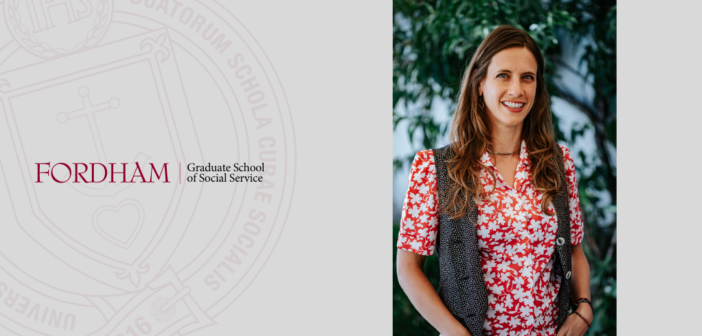Joy Bittner, GSS ‘08, wants to make evidence-based mental health care more accessible to the people of Ecuador, where she’s lived for 13 years. She’s using the power of strong community ties to overcome the barriers currently in place.
Bittner moved to Latin America after graduating with her Master of Social Work (M.S.W.) from Fordham’s Graduate School of Social Service, living in the Dominican Republic, Honduras, and Argentina before settling in Ecuador. She’s seen firsthand how the lack of mental health service infrastructure, coupled with the perceived stigma of the services that do exist, leads to, unfortunately, poor outcomes in each of these areas. Moreover, those services operating in Latin America didn’t use the evidence-based approach Bittner felt would drive impact, a concept she learned during her time at Fordham.
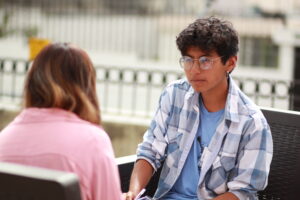
Photos courtesy of Joy Bittner
“The importance of evidence-based models and practice stuck with me from my time at Fordham,” Bittner said. “What I was seeing in the international development world was a lot of projects with good intentions but not a strong focus on impact and evidence.”
In 2022, Bittner founded Vida Plena, a mental health organization based out of Ecuador that provides evidence-based depression treatment to Ecuadorians and refugee communities at scale. Vida Plena trains locals to facilitate Group Interpersonal Therapy (g-ITP)—recommended by the World Health Organization (WHO) as the first line of treatment in low-resource settings—in their communities for a scalable solution to mental health issues.
“[Vida Plena uses] a highly scalable, cost-effective, community-based model,” Bittner said. “Seventy-six percent of people finish the program with mild to no depression symptoms. It’s people in the community coming together to support one another. We’re working together to resolve the problems we’re facing.”
International Social Work Drive
Bittner started her social work journey as a prospective student from Connecticut looking for a career path that would give her options. She was particularly interested in international work, and saw the M.S.W. degree as a versatile credential that would give her the flexibility she sought.
“[Social work] gives you a wide range of opportunities,” Bittner said. “What drew me to Fordham was the school’s international focus, particularly working with immigrants and refugees.”
Once enrolled as an M.S.W. student at the Graduate School of Social Service, Bittner completed her field internship through Fordham’s collaboration with the United Nations, working on position papers and events with the International Federation of Social Workers (IFSW).
“I had a badge and got to go to UN meetings,” Bittner said. “It was exciting.”
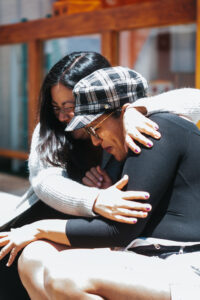
Photos courtesy of Joy Bittner
Bittner spent her summers working in the Domincan Republic for community development organizations. The summer after her first year in the M.S.W. program was the first time she’d ever lived outside the United States. Bittner didn’t speak Spanish, so navigating things like public transportation was a stressor in addition to her responsibilities in the workplace.
Her experiences in those summers were formative, and along with her field education internships, Bittner received responsibilities uncommon to most 20-year-olds straight out of undergrad. Working as an intern at the Stanley Isaacs Center in Harlem, Bittner was responsible for creating an English as a Second Language program—including hiring the teachers and facilitating the relationships with local partner schools.
“To have all that experience in my first year out of college was great,” Bittner said. “It was an opportunity to do things that were real and put them on my CV and see what it’s like managing people.”
Importantly, graduate school allowed Bittner to experience what she didn’t personally want in a career. After receiving the opportunity to counsel several students—working individually in a therapist’s capacity—she realized micro work was not where her passion was. Bittner wanted to impact change on a broader scale.
“It was the best-case scenario to figure that out sooner rather than later,” she said. “While one-on-one clinical therapists are definitely important and needed, I wanted to do something that was a little bit bigger and implement wider change.”
With that in mind, she headed back to Latin America after graduation.
A Flourishing Life
Once in Ecuador, Bittner worked for eight years at Faire Collection, a lifestyle brand of fair trade accessories crafted by local artists using natural materials to craft jewelry. However, although the company’s mission added positive value to the community, Bittner said something was missing.
In 2020, inspired by the work she saw from The Friendship Bench—a Zimbabwean Non-Governmental Organization (NGO) dedicated to improving mental healthcare—and a worldwide pandemic that exacerbated the necessity for evidence-based solutions, Bittner founded Vida Plena. Her mission: bring a rigorous, evidence-based, community-centered mental healthcare approach to Latin America.
“No one was doing anything like this in Latin America,” she said. “I was coming back to my roots.”
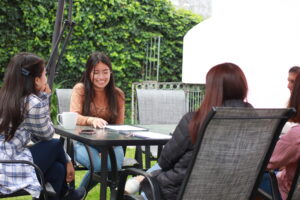
Photos courtesy of Joy Bittner
Vida Plena’s operating model functions like this: Bittner’s team trains local Ecuadorians to become group facilitators, who execute the Group Interpersonal Therapy sessions within the community. In collaboration with the trained facilitators, Bittner’s team conducts community outreach to refugees and at-risk community members to participate in the group therapy sessions. Once those individuals are recruited, they form groups of eight members to complete nine weeks of sessions—one session per week. Than, Bittner and her team measure the results, using those insights to improve the model. And so on.
Bittner says the key to making the whole thing work is the community aspect—facilitators are neighbors and friends who just want to help. It lets everyone put their guard down just enough to make progress.
“Rather than people coming into sterile mental health clinics and dealing with the stigma and fear that comes with it, facilitators work out of community centers, churches, and schools,” she said. “Facilitators have similar lived experiences as the group members—they understand where you’re coming from.”
Not only is Vida Plena’s approach grounded in evidence-based practices, it is also backed by esteemed academic institutions. Bittner’s organization is the first team in Latin America to be certified in Group Interpersonal Therapy by Columbia University.
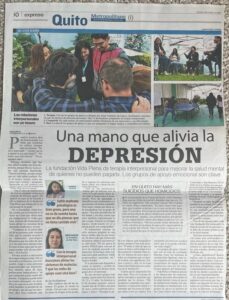
Photos courtesy of Joy Bittner
The relationship between Vida Plena and Columbia formed through Bittner’s scrappy, grassroots resourcefulness. After downloading the WHO’s manual on group Interpersonal Therapy, Bittner took her father’s advice to call the authors. They responded and were thrilled to help.
“The Columbia team is exceptional. They gave us the guiding markers on how to do this,” she said. “They provided initial training for our pilot and supervision for over a year to ensure the program model was being implemented correctly.”
In 2023 Vida Plena’s first year in operation, it reached over 500 people. And that was just the beginning.
A Mental Health Solution for All of Latin America
Vida Plena’s model was built for scale. While most of her organization’s work has taken place in Quito, Ecuador’s capital, Bittner has expansion plans. This summer, Vida Plena will branch into new geographic locations, including Ecuadorian neighboring state Imbabura. Since this is a more rural and indigenous population, Bittner plans to collaborate with locals to implement cultural adaptations into the model—hopefully resulting in a more thoughtful experience.
“They have no mental health care available that’s culturally appropriate,” she said.
But Bittner has even bigger ambitions than regional scaling. She sees the potential for a national movement.
“We started in Ecuador, but we want to make sure quality evidence-based mental health care is available anywhere in Latin America,” she said.
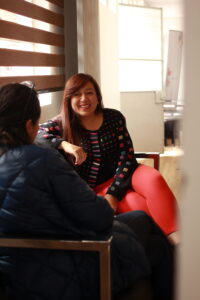
Photos courtesy of Joy Bittner
To accomplish this, Bittner’s team is rethinking how they address outreach and evaluation. By leaning into behavioral health methods, the team is implementing nudges to improve client outcomes. This keeps them engaged longer to confirm the therapeutic methods are delivering a lasting solution, not a short-term bandaid.
“We want to deepen our impacts and study long-term impacts,” she said, “by doing follow-ups three and six months out to show it’s helping long-term and see if there are other components we need to add.”
Doing all this work to create and operate an organization is hard enough when you have the resources. Bittner finds herself in a situation where the mental health care infrastructure is almost nonexistent, and even her own technology can give her difficulties. How does she manage such large goals with the limitations of reality?
Bittner’s groundedness is a masterclass on dealing with any situation: control what you can control.
“This is ultimately God’s work,” Bittner said. “I’m the gardener—I plant the seeds and pull the weeds, but I can’t force the sun to be out or the seeds to sprout.
“I don’t resolve myself of any responsibility, but I do the best I can. We follow all protocols to help and support people, but at the end of the day, we can’t prevent them from making their own decisions. We have human limitations. I’ve been gifted this opportunity to be a part of this bigger and broader mission. I’m grateful for the team—the group facilitators hear people’s stories and walk with them through pain to find solutions.”
Learn More about Vida Plena
Bittner provided us with two videos to further showcase her organization’s impact. Please watch them at the links below:
